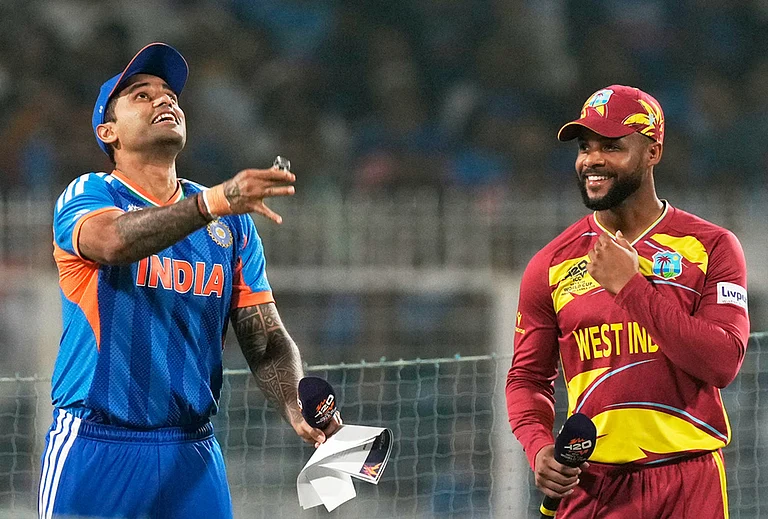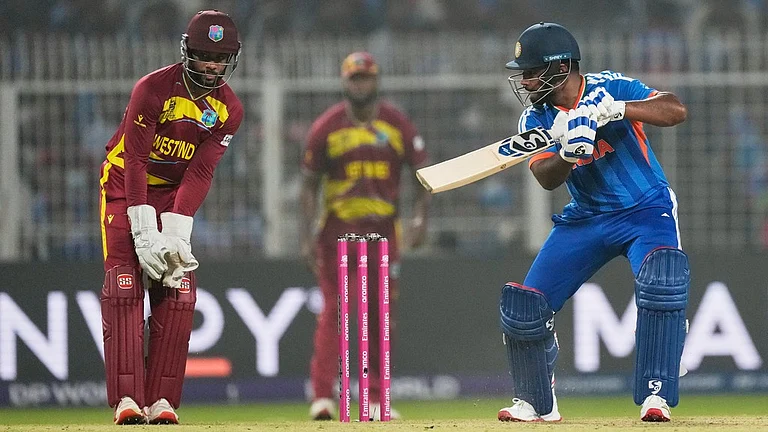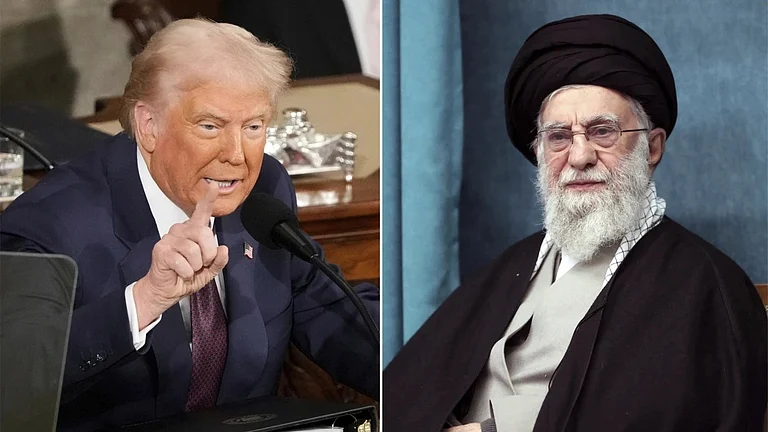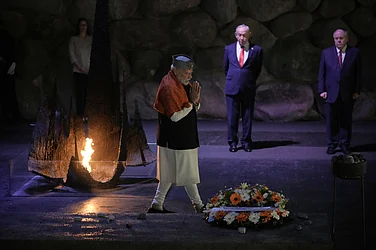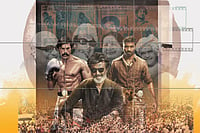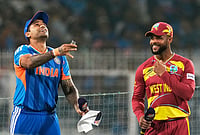A nondescript traffic junction named after the 90-year-old state-owned Mysore sugar factory, became popular across the state of Karnataka and beyond due to a new gateway erected in the run-up to Prime Minister Narendra Modi’s visit to Mandya on March 12th. The local BJP office chose this junction to install one of the four Mahadwaras (Grand Gateways) welcoming the Prime Minister and called it the ‘Uri Gowda and Dodda Nanje Gowda Mahadwara’. It was supposed to honour the two Vokkaligas that the state’s ruling party has begun to claim as having killed Tipu Sultan, the 18th century ruler of Mysore (now Mysuru). However, colonial and Indian archival records from the 18th century onwards as well as scholarship on Mysorean history by several historians have established that it was the British army that executed Tipu Sultan on 4 May, 1799 during the fourth Anglo-Mysore War.
When historians and social media commentators criticised the Uri Gowda-Nanje Gowda gateway, citing a lack of historical evidence for the claim that they killed Tipu Sultan, the BJP replaced the gateway with one honouring Balgangadharnath Swamiji, the late seer of the Adichunchanagiri Math located in Mandya district.
But some BJP leaders refused to back down. Horticulture minister Munirathna, who is also a film producer, announced that he would make a movie on the lives of the Gowda brothers. The movie poster even credited the story to Dr Ashwath Narayan, Karnataka’s minister for higher education.
As historians and opposition party leaders began to roll up their sleeves to counter what they called an attempt to revise history with fictional characters towards wooing the voters of the Vokkaliga community, it suddenly resolved itself with a firm fact-check from an influential religious leader. Nirmalanandanatha Swamiji, the pontiff of the Adichunchanagiri Math, considered the main religious institution of the Vokkaligas in the state, released a video requesting all politicians “to stop meddling with history without any proper evidence.”

But the gateway didn’t start the fire. It was first lit in November 2022 by a Kannada play, and a playwright who wanted to “tell the truth about Tipu Sultan.” It all began when Addanda Cariappa, director of Rangayana Mysuru, the most coveted of Karnataka’s six state-run theatre repertories, released his new Kannada play Tippu Nija Kanasugalu (The Real Dreams of Tipu.) The title is a retort to the late playwright Girish Karnad’s 1997 play Tippuvina Kanasugalu (The Dreams of Tipu).
When Cariappa took over as director in 2019, senior theatre artists had alleged that he was a political appointee as his name was not among the three proposed by Ranga Samaja, the governing council of state theatre repertories in Karnataka. In December 2021, Cariappa invited Chakravarty Sulibele—someone who had spoken against halal certification and for a law to prevent ‘love-jihad’—as a guest to ‘Bahurupi,’ an annual theatre festival organised by Rangayana Mysuru. Former Rangayana artists, directors and activists questioned the relevance of Sulibele to theatre and protested at the premises and wrote to Chief Minister Basavaraj Bommai. But Cariappa had dismissed the dissenters as ‘Maoists.’
I read Cariappa’s Kannada play Tipu Nija Kanasugalu published by Ayodhya Publications. The cover depicts Tipu glowering at the reader, baring his teeth, his eyes bloodshot. In an unusual playwright’s note titled ‘True Historical Drama’, Cariappa alleges that “the history of some of India’s invaders”—an allusion to Muslim kingdoms here—“has been incorrectly portrayed in the name of secularism and humanity.” He writes that after India became independent from colonial rule, it fell prey to a ‘fake’ new rule of dynasties and pseudo-secularism that glorified Tipu Sultan as a freedom fighter. Cariappa criticises Jnanpith and Padma Bhushan awardee Girish Karnad for writing a play on Tipu commissioned by the British Broadcasting Corporation (BBC) in the 50th year of Indian Independence. He blames Karnad for leaving out accounts of Tipu’s alleged misrule, attacks on temples and forced religious conversions.

His own play on the other hand, argues Cariappa, is based on his extensive readings, primarily of K M Panicker, who reportedly translated Tipu’s letters found in London’s India Office Library from Persian to Malayalam in the 1920s. He claims that he wrote the play to show the truth about Tipu Sultan on the occasion of the 75th year of Indian independence. The play itself has 15 scenes, all arguing this: Tipu Sultan was a coward attempting to flee the battle scene during the fourth Anglo-Mysore war; his own subjects, both Muslims and Hindus, were unhappy with Tipu’s rule; Tipu was a religious fanatic whose primary mission was to convert the whole region into an Islamic state; and finally, in a very short scene, he gets killed by two Vokkaligas, Uri Gowda and Nanje Gowda, not the British.
The play was first performed at Rangayana Mysuru on November 20, 2022. Since then, the play has toured 20 districts in the state and performed over 50 shows. The likes of cabinet minister Pralhad Joshi and BJP MLA Arvind Bellad have watched the play. Cariappa says the play has been running to full houses in most places.
Till Cariappa’s claim, historical records showed that Tipu fell to a British bullet, shot by an unknown soldier. The earliest written account of the ruler’s death is in Lieutenant Colonel Alexander Beatson’s A View of Origin and Conduct of War with Tippoo Sultaun, published in early 1800, based on eyewitness accounts of British officers in the fourth Anglo-Mysore war. Beatson had also fought in the war. He writes that once the British had breached the fort of Seringapatam (anglicised version of Srirangapatnam), General David Baird sent a party to the main palace to find out about Tipu’s whereabouts. Upon learning from the fort in-charge that Tipu lay wounded near the water gate, the search party reached there to find Tipu’s body amongst those of Mysore soldiers. Raja Khan, Tipu’s main servant, narrated to the British officers that Tipu was wounded by a European storming party when he was attempting to enter the fort. He was shot in his left breast and had injuries in the leg. By this time, another European party forced their way in and one of the red coat soldiers tried to snatch the gold buckle from Tipu’s sword belt. Tipu struck him with the sword. Enraged, the soldier shot Tipu in the temple behind his ear, instantly killing him. This account has been repeated in most colonial records—both British and French. Domestic accounts such as that of Tipu’s Brahmin accountant Punganuri Ramchandra Rao’s Memoirs of Haidar and Tipoo, rulers of Seringapatam (1848) and the court historian Mir Hussain Ali Khan Kirmani’s Tareekh - i - Tipu Sultan do not give a detailed account like Beatson does but mention that Tipu Sultan was killed by British soldiers in battle.
***
On the eve of the 50th show of Tipu Nija Kanasugalu in Mysore, I meet Cariappa in his office.
Seated underneath a portrait of British playwright William Shakespeare, with his ‘Vishwa Hindu Parishad’ bag next to him, Cariappa says his goal as the director of Rangayana was to implement his “ideological beliefs and transform it into an institution which concerns itself with thinking about the nation through theatre.”

Born in Ponnampet in Kodagu (formerly Coorg) district, Cariappa studied Military Science in the nearby Gonikoppal Government College. Having completed his theatre training at the acclaimed Ninasam theatre school in Heggodu, he wrote and directed plays in his mother tongue of Kodava for 35 years. He says he made a Kodava film, and introduced news programmes in the local language at the Madikeri radio station. He has received several prestigious state awards for his efforts, including the ‘Bhasha Samman’ award by Sahitya Akademi for preserving the Kodava language.
As the head of Rangayana Mysuru, Cariappa says he will not allow “plays which sympathise with naxalism and plays which call for breaking the nation into tukde tukde (pieces) under the garb of secular and progressive talk.” He continues, “If I were to put it boldly, there should not be any place here for Leftist ideology which often sides with terrorists and traitors.” In our long conversation, he says unequivocally that he sought to rewire the culture and politics of Rangayana’s theatre to make it “more nationalistic and patriotic.” Elaborating on his plans for Rangayana, Cariappa says, “I will unveil the truths that were intentionally hidden by others until now. Tippu Nija Kanasagalu is a part of this mission. Look at the themes of my programmes, Gandhi Pata (Gandhi’s path), Taayi (Mother) and Bharteeyete (Indianness).” He alleges that earlier playwrights have whitewashed the anti-Hindu crimes of Tipu Sultan, like his “atrocities on Kodavas, his massacre of Mandyam Iyengars, conversion of Hindus to Islam and demolishing Hindu temples.” He questions the credibility of British accounts of Tipu’s death, asking why we tend to “ignore our local oral accounts’.’
“Did any Hindu ruler like Kittur Chennamma or anyone else demolish any mosques?” Cariappa asks. When I asked him about the Babri Masjid demolition, he simply replies that he is a “lifelong member” of the Rashtriya Swayamsevak Sangh (RSS).
“I did not create Uri Gowda and Dodda Nanje Gowda,” he says, claiming they already existed in previous historical accounts. The first one he mentions is the Suvarna Mandya, a collection of essays first published in the 1990s and republished in 2006 by the then state government. Prof Jayaprakash Gowda, editor of the 2006 edition, explained that the late H K Rajegowda, the author of an essay from the collection Cariappa mentions, was a Kannada literature scholar with an interest in collating local folklore. He had heard of two clever young men named Uri Gowda and Nanje Gowda who often escaped from the British. In his essay, Rajegowda writes, “Uri Gowda and Nanje Gowda stood steadfast in opposition to Tipu, probably because of his religious policies and choice of Persian as the official court language.” “But he did not write that they killed Tipu,” says Prof Gowda, adding that Rajegowda was no historian and that one should should not assume his speculation as the historical truth.
Cariappa’s second citation was the mention of the Vokkaliga brothers in a particular lavani (folk song). He was repeating a claim that has already been deemed incorrect. The editorial team of the Kannada culture website Ruthumana, which had published the recording of the said lavani, clarified on 19 March that the line Cariappa quoted does not exist in the song and that “someone must have misinformed him”.
Every time I tried to reason with Cariappa about historical sources or ask him about the one-dimensional characterisation of Tipu in his play, he returns to his pet peeve, asking why only he was being questioned and not others.
When asked about his personal opinion on Tipu’s reign, Cariappa first offers a disclaimer— that he was not anti-muslim. “I have Muslim friends, and a Muslim actor is acting in my play.’’ Then, he adds, “Tipu was a religious fanatic. A fanatic might also undertake developmental projects. But just because he developed the region, I won’t accept a religious fanatic. And Tipu was neither a secular king nor a freedom fighter like these people say.” Cariappa is upset that Congress governments have used Tipu in the past to ‘appease the Muslim vote bank’, like former Chief Minister Siddaramaiah’s decision in 2015 to celebrate the ruler’s birthday annually.
There is no doubt that Cariappa’s interest in Tipu Sultan takes root in a political project and not in an artistic curiosity to critically examine a historical personality.
The play itself gives its writer away. The Gowda brothers do not have a character arc and suddenly appear in Scene 14, the penultimate scene of the play. They encounter Tipu who is running away from the fort amidst cries of Har Har Mahadev. Uri Gowda taunts Tipu, “Wait Sultan ji, where are you running away? You are a tiger, tiger! Why are you running away like a mouse?”
The next moment, the brothers proclaim that they are the loyal servants of the Wodeyar queen Lakshmi Ammani Devi and that Tipu is their enemy, not the British. They then shoot him dead.
For characters involved in the most important action of the play, the playwright makes no effort to contextualise them or flesh them out, using them, instead, as representations of a political idea. It is not surprising that critics have dismissed it as an effort to provide the ruling BJP an issue around which to rally Vokkaliga votes in the upcoming elections.
Cariappa does publish some historical material like Tipu’s letters to his officers in the wars in Kerala but chooses only those which depict him meting out instructions to punish the rebels, including forcing them to convert to Islam. He leaves out other examples such as a letter exchange with the seer of the Sringeri Mutt detailing Tipu’s donations for the temple’s restoration. Cariappa also incorrectly depicts Tipu declaring to courtiers in his last darbar (court) that the Caliphate was their last hope. By 1799, when the fourth Anglo-Mysore war was imminent, Tipu was only corresponding with the French and had no delusions about support from the Caliphate.
In an intriguing scene loaded with betrayal and conspiracy, Cariappa invokes a religiously divisive tale popular among some sections of Kodavas. The scene shows Tipu and his men killing thousands of Kodavas gathered at Devatiparambu using deceit. A 1924 folklore compendium Pattole Palame written by Nadikerianda Chinappa mentions this claim. So does Cariappa’s 2015 book Tippu Mattu Kodavaru. While there are records of the imprisonment, there are no contemporary historical sources that mention the massacre of unarmed Kodavas. The numbers mentioned in these books, over 80,000 Kodavas imprisoned and 60,000 killed, are highly exaggerated as the population of Kodavas in the 18th century was not as high. But these tales have gathered currency with time and have contributed to Tipu’s vilification.
Although Cariappa vigorously defends his play in the media, the ruling political class seems to have decided not to engage with it for now.
If the play and the BJP’s special ‘Mahadwara’ for PM Modi’s inauguration were focused on gaining traction for the party in Mandya region, a Vokkaliga heartland and JD(S) stronghold, it did not work. Cariappa’s play has been performed twice in Mandya city since it started touring but has received a lukewarm response. Local journalist Vageesh explained that although Mandya’s residents always had an affinity towards the Mysuru king Krishnaraj Wodeyar IV and it is possible that they resented Tipu Sultan during his reign, the names of Uri Gowda-Nanje Gowda “were never in public memory and most of the people in Mandya had not even heard of them until now.” In March, local voters seemed more concerned about issues such as the closure of a sugar factory and the loss of income due to the new Bengaluru-Mysuru highway which bypasses their city. Author and senior journalist Sugata Srinivasraju calls the Gowda episode a straightforward Hindutva project to create doubt and suspicion about a Muslim ruler but is cautious about declaring it a failure. “They have been forced to step back for now because the old mandal players like H D Deve Gowda are still around. But this is how all myth-making experiments begin”.
When Cariappa’s play was released, B S Rafiulla, the former chairman of Chikballapur district Wakf board, got a temporary injunction from the city civil court on its publication but the court later vacated the injunction while observing that the narrative and the dialogues of the play “are an imagination of the author and are not based on actual history as claimed in the foreword and preface.”
On whether they’ll remove the claim to historical truth in its next edition, Rohit Chakrateertha, the publishing editor at Ayodhya Publications, says, “As of now we have not decided on publishing the next edition. We will consult our advocates about any changes in the foreword and playwright’s note.” Neither he nor other members of the editorial team found anything wrong with the play, he said, and if watched without any prejudice, the play “does not come across as a deliberate negative characterisation of Tipu Sultan.”
According to historian and professor Janaki Nair, who has worked extensively on Mysuru’s modern history, ideas of history tend to circulate in different realms—tourist guide narratives, folklore, academia etc —which were not necessarily congruent. But now, she adds, “there is a flattening of all these realms into a single narrative and that is of clear heroes and villains.” She says that allegations of historians having ignored local and oral sources were baseless. Nair herself has worked with folk sources, and so had the Late Professor MM Kalburgi, who had “painstakingly assembled the Kaifiyats (historical records from the Deccan region), which are as indigenous as it gets.” Nair warned that historians must follow “rigorous methodology to interrogate all kinds of sources,” especially in cases like that of the history of Tipu Sultan, where there were multiple sources in French, English, Marathi, Kannada, and Persian.
Whether it has electoral leverage or not, the valorisation of, by all accounts, the fictional Gowda brothers, as Vokkaliga and Hindu heroes for killing Tipu Sultan, is an illustration of a concerted attempt by BJP and RSS supporters to transform the way popular opinion is manufactured about historical characters. And with reams of social media content about the brothers, state patronage to Cariappa’s play, and a printed book, Uri and Nanje Gowda might now feature regularly whenever Tipu Sultan is discussed in the public sphere. It will do us well to remember, that as the fact-friendly Vokkaliga guru put it, let us not make heroes that divide us.
(Views expressed are personal)
(This appeared in the print as "Myth-Making in Mysuru")
Basav Biradar is a writer, researcher and documentary filmmaker







